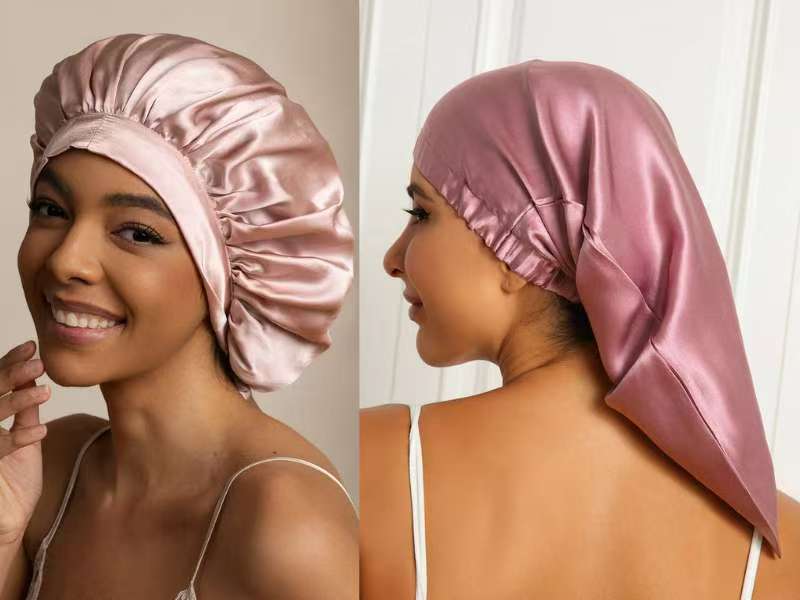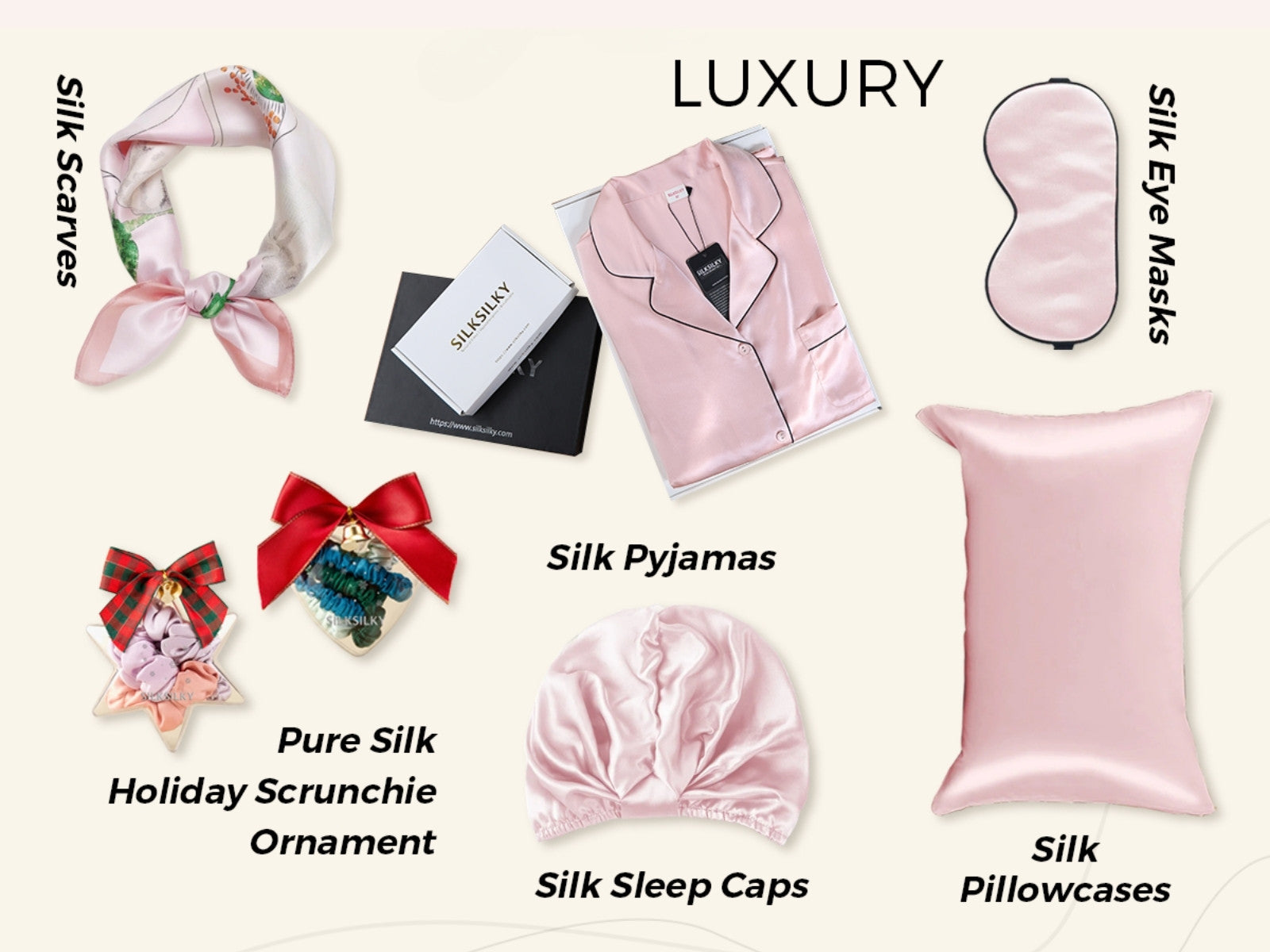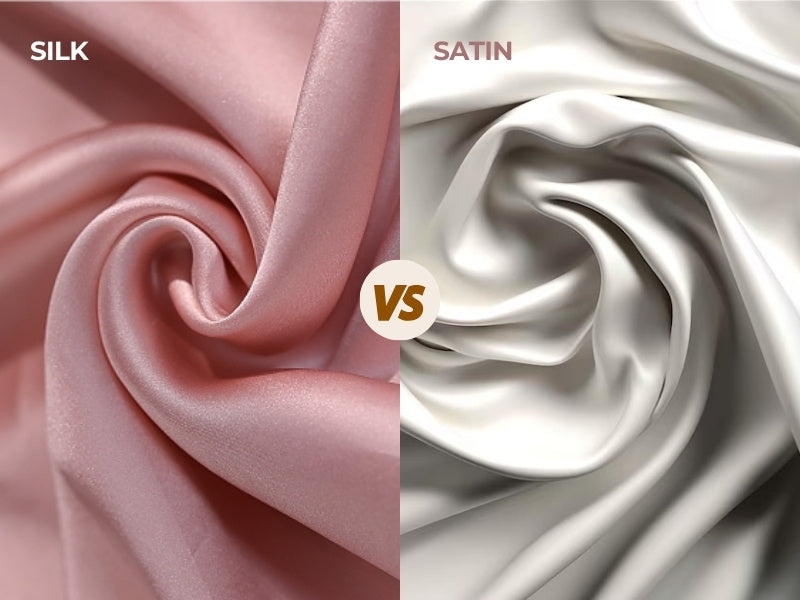Silk vs. cotton,satin sheets: which is best for sleep
Table of Contents
Introduction
We all spend about a third of our lives in bed, so it's crucial to consider which bedsheets can provide the most comfortable nights. Should you opt for affordable yet less durable cotton sheets, smooth and soft but less breathable satin sheets, or slightly pricier but highly durable, breathable silk sheets that benefit both your skin and hair? In this blog, we'll compare these three materials to help you make the best decision.
Understanding Silk, Cotton, and Satin
Silk, cotton, and satin are three popular materials used in bedding, each offering unique characteristics that cater to different preferences and needs. Understanding the qualities of these materials can help you choose the best option for your sleep comfort and overall satisfaction.
Silk: Luxurious Comfort with Natural Benefits
Silk is renowned for its luxurious feel and natural benefits. It is a natural protein fiber produced by silkworms when forming their cocoons. Silk sheets are exceptionally smooth and soft to the touch, providing a cool sensation in warm weather and warmth during cooler seasons. The fabric's smooth texture reduces friction on skin and hair, preventing hair breakage and skin irritation. Silk is also hypoallergenic, resistant to dust mites and mold, making it an excellent choice for those with allergies or sensitive skin. Additionally, silk has moisture-wicking properties that help regulate body temperature, promoting a comfortable and restful sleep.
Cotton: Versatile and Breathable
Cotton is one of the most widely used materials in bedding due to its versatility and breathability. It is a natural fiber derived from the cotton plant's seed pods, known for its softness and comfort. Cotton sheets are highly breathable, allowing air circulation and moisture absorption, which helps keep you cool and dry throughout the night. They are also durable and easy to care for, typically becoming softer with each wash. Cotton bedding comes in various weaves and thread counts, offering a wide range of options from crisp percale to silky sateen, catering to different preferences for texture and feel.
Satin: Smooth and Lustrous
Satin refers to the weaving technique rather than a specific fiber. It can be made from silk, polyester, or other synthetic fibers. Satin sheets are characterized by their smooth and shiny surface, providing a luxurious appearance and a silky feel. While silk satin is highly prized for its natural sheen and softness, synthetic satin is more affordable and easier to care for. Satin sheets are known for their ability to retain warmth, making them ideal for cooler climates or individuals who prefer a warmer sleep environment. However, satin may not offer the same breathability as silk or cotton.
Choosing the Right Bedding Material
When selecting bedding materials like silk, cotton, or satin, consider factors such as climate, personal preferences for texture and feel, and any specific skin sensitivities or allergies. Silk offers unparalleled luxury and natural benefits, making it ideal for those seeking a premium sleep experience. Cotton provides versatility, breathability, and durability, suitable for various climates and preferences. Satin, whether made from silk or synthetic fibers, offers a smooth and lustrous surface that adds elegance to your bedroom décor.
By understanding the unique qualities of silk, cotton, and satin, you can make an informed decision that enhances your comfort, promotes better sleep, and contributes to your overall well-being. Whether you prioritize luxury, breathability, or ease of care, there is a bedding material that meets your needs and preferences perfectly.
Comparison of Silk, Satin, and Cotton Bed Sheets
Temperature Regulation
Silk: Excellent at regulating temperature; keeps you cool in summer and warm in winter.
Cotton: Breathable and helps regulate temperature well throughout the year.
Satin: Less breathable than silk and cotton, making it less ideal for hot sleepers.
Comfort
Silk: Exceptionally soft and smooth, luxurious feel against the skin.
Cotton: Comfortable, natural feel, suitable for all seasons.
Satin: Smooth and silky feel, but some may find it less comfortable due to its lower breathability.
Durability
Silk: Highly durable with proper care, can last for many years.
Cotton: Durable and can withstand frequent washing; longevity depends on thread count and weave.
Satin: Less durable than silk and cotton, more prone to snagging and wear over time.
Breathability
Silk: Excellent breathability, helps maintain a comfortable sleep environment.
Cotton: Very breathable, absorbs moisture and keeps you dry.
Satin: Less breathable than silk and cotton, may trap heat and moisture.
Hypoallergenic Properties
Silk: Naturally hypoallergenic, resistant to dust mites and mold.
Cotton: Generally hypoallergenic, but can retain allergens if not washed regularly.
Satin: Depending on the material, satin may not be as hypoallergenic as silk or cotton.
Maintenance
Silk: Requires delicate care; usually dry clean or hand wash.
Cotton: Easy to care for, machine washable and durable.
Satin: Requires gentle handling to maintain its sheen; often recommended for delicate cycles or hand washing.
Price
Silk: Generally more expensive due to the intricate production process and high-quality material.
Cotton: Affordable and available in a wide range of prices based on thread count and quality.
Satin: Moderately priced, but quality can vary widely based on the type of fiber used.
Impact on Skin and Hair
Silk: Smooth surface reduces friction, helps prevent hair breakage and minimizes wrinkles on the skin.
Cotton: Gentle on the skin and hair, allows for natural movement during sleep.
Satin: Provides a silky surface that reduces friction, similar to silk but may vary in effectiveness depending on the material.
Common Specialized Questions About Silk, Satin, and Cotton Sheets
Q: What distinguishes silk from satin and cotton in terms of feel and texture?
A: Silk is known for its smooth, luxurious feel that is cool to the touch. Satin, on the other hand, is characterized by its glossy surface and can be made from various fibers, including silk, polyester, or nylon. Cotton is naturally soft and breathable, but its texture is more matte compared to silk and satin.
Q: Which type of sheet is best for maintaining coolness during sleep?
A: Silk is excellent for maintaining a cool temperature throughout the night due to its natural breathability and moisture-wicking properties. Satin can feel cooler than cotton but may not offer the same level of breathability as silk. Cotton sheets are also breathable but may retain more heat than silk or satin in warmer climates.
Q: Are silk sheets slippery to sleep on?
A: Silk sheets bed have a smooth texture that may feel slippery initially, especially if you are accustomed to cotton or other materials. However, they tend to conform to the body and provide a comfortable sleeping surface without excessive slipping.
Q: How do satin sheets compare to silk in terms of comfort and durability?
A: Satin sheets can be comfortable due to their smooth surface, but their durability depends on the type of fibers used. Pure silk sheets are generally more durable than satin sheets made from synthetic fibers like polyester. Silk also tends to be more breathable and better at regulating body temperature compared to satin.
Q: Do silk sheets require special care compared to satin and cotton?
A: Yes, silk bed sheets require more delicate care to maintain their quality. They should be hand washed or machine washed on a gentle cycle with cold water and a mild detergent. Satin sheets, depending on the material, may have specific care instructions similar to silk. Cotton sheets are easier to care for and can withstand regular machine washing.
Q: Which type of sheet is more prone to wrinkles: silk, satin, or cotton?
A: Silk and satin sheets are more prone to wrinkling compared to cotton, especially if not cared for properly. Cotton sheets tend to wrinkle less due to their heavier weight and natural fiber structure.
Q: Are silk, satin, or cotton sheets better for sensitive skin or allergies?
A: Silk is naturally hypoallergenic and less likely to aggravate sensitive skin or allergies compared to satin or cotton, especially if the cotton has not been thoroughly cleaned or is made from synthetic fibers.
Silksilky—Your Ultimate Choice for Silk Sheets
Silksilky offers premium 6A grade mulberry silk, known for its exquisite quality, affordability, and diverse range of options. When it comes to enhancing your nightly sleep and overall health, their silk sheets stand out as the perfect choice.
Why Choose Silksilky Silk Sheets?
Superior Quality: Silksilky's silk sheets are crafted from 6A grade mulberry silk, renowned for its fine texture, durability, and luxurious feel. This ensures a smooth and comfortable sleeping experience every night.
Affordability: Despite their high quality, Silksilky silk sheets are priced affordably, making luxury bedding accessible without compromising on comfort or style.
Variety: Silksilky offers a wide range of options to cater to different preferences and needs. Whether you prefer a classic solid color or a subtle pattern, there's a silk sheet set that suits your taste.
Health Benefits: Silk sheets from Silksilky are not just about comfort; they also contribute to your overall health. Silk is naturally hypoallergenic, resistant to dust mites, and helps regulate body temperature, promoting better sleep and skin health.
Customer Satisfaction: Silksilky prioritizes customer satisfaction, ensuring each product meets high-quality standards and provides exceptional comfort and durability.
Enhance Your Sleep and Health with Silksilky
Investing in Silksilky silk sheets is more than just upgrading your bedding—it's about improving your sleep quality and well-being. Experience the luxury of silk and enjoy nights of unparalleled comfort and rejuvenation.
Conclusion
When choosing the best bedsheets for your sleep and overall comfort, consider your priorities—whether it's luxurious comfort and temperature regulation with silk, versatility and affordability with cotton, or the smooth, glossy feel of satin. Each material has its unique benefits and considerations, so make an informed decision based on your personal preferences and needs.
![[Light Blue] SilkSilky Pure Silk Round Neck Camisole Set 001](http://silksilky.com/cdn/shop/files/5e1ae4465dd028df60baace786d42632_68928705-aeec-485b-8a8d-94e69d5bd953.jpg?v=1760407204&width=1200)
![[Light Blue] SilkSilky Pure Silk Round Neck Camisole Set 002](http://silksilky.com/cdn/shop/files/47584f0811efc799212e0bdae1fdd2f1_26412900-1da5-4bff-addf-d7e16835149b.jpg?v=1761821217&width=1200)
![[Light Blue] SilkSilky Pure Silk Notch Collar Women's Pajamas 001,](http://silksilky.com/cdn/shop/files/ab83afb9301666ee2f174a8ae72ffda4_4e9bb488-7880-40fe-9e69-f0fd823857c5.jpg?v=1764653199&width=1200)
![[Light Blue] SilkSilky Pure Silk Notch Collar Women's Pajamas 002,](http://silksilky.com/cdn/shop/files/db8dbeee5354fe3b631b963715847ffe.jpg?v=1764653202&width=1200)
![[Pink] SilkSilky Pure Silk Sleep Cap 001](http://silksilky.com/cdn/shop/files/SilkSilky_Pure_Silk_Sleep_Cap_Pink_001_C-250529006.jpg?v=1762221980&width=1200)
![[Pink] SilkSilky Pure Silk Sleep Cap 002](http://silksilky.com/cdn/shop/files/1738767123_1282c43b-9916-42b4-90f1-1050ec5516b3.jpg?v=1768284813&width=1200)
![[White] SilkSilky Pure Silk V Neck Nightgown 001,](http://silksilky.com/cdn/shop/files/a8ae95260a57844b1e2e00c4fcfabdcc_b922b270-af10-4e96-9493-0d877bd663db.jpg?v=1764140639&width=1200)
![[White] SilkSilky Pure Silk V Neck Nightgown 002,](http://silksilky.com/cdn/shop/files/24ac506750f8c38c51bb5b6d0ee15287.jpg?v=1764140639&width=1200)
![[Pink] SilkSilky Pure Silk V Neck Nightgown 001](http://silksilky.com/cdn/shop/files/01f17160f8e04cb0820fb6f48212e731.jpg?v=1762229718&width=1200)
![[Pink] SilkSilky Pure Silk V Neck Nightgown 002](http://silksilky.com/cdn/shop/files/77101f867782a1e2528805babc28e706.jpg?v=1762229717&width=1200)











